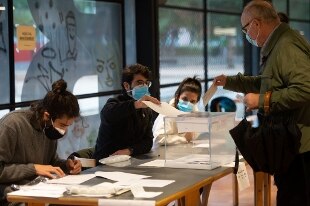Catalonia to vote, examination for Sánchez and verification of the divided separatists
Catalonia, EU court in Spain: "Liberi Junqueras, has immunity"
Catalonia.
Separatists block highway with France
Catalonia, new event in the evening.
Torra: no to violence but we will go on
Share
by Tiziana Di Giovannandrea
February 14, 2021 Voter turnout in the regional elections in Catalonia in sharp decline.
Compared to four years ago, at 1pm only 22.78% of the voters presented themselves to the polls, while in 2017, at the same time 34.69% of those entitled had voted.
The cause of the lack of affection for the vote of the Catalans has a double origin: on the one hand the fear of coronavirus infections and on the other the disillusionment of the voters.
5.6 million citizens are called to the polls.
Numerous appeals from politicians to vote.
The seats for the renewal of the Parliament of the Spanish autonomous region, where 135 deputies are elected, close at 20.00 but the hours of access to the seats have been staggered due to the pandemic: from 9 to 12 people considered at risk voted (over 65, patients with previous pathologies and pregnant women);
from 12 to 19 it will be up to voters not at risk and from 19 to 20 to positives and for those who are in quarantine due to close contact with a positive.
Provide masks, gloves, body protectors and visor.
The first results are expected around midnight, but it is not excluded that for the definitive results we have to wait for Monday or even Tuesday if the health situation makes the night ballot inadvisable.
Furthermore, the record number of votes per correspondence (284,000) could mean that the final outcome will take longer than usual.
The balance in this electoral round is in the hands of the undecided, who represent 37% of those entitled to vote.
The political situation in Catalonia is somewhat fragmented.
It is difficult to predict whether the socialists - head of the Madrid government - will succeed in removing the separatists from regional leadership after a failed attempt at secession more than three years ago.
The goal of the separatists is not only to keep the majority in the Barcelona Parliament but also to break, for the first time, the 50% popular vote barrier.
The PSC, the Catalan Socialist Party, which can count on the former Minister of Health of the Sánchez government, Salvador Illa, seems to have a slight advantage at 22%, a figure that could lead to diluting the secessionist push in the region.
Followed by Junts for Catalunya, the formation of Carles Puigdemont between 20 and 21%, which sees Laura Borràs running, and ERC, Esquerra Republicana (Republican Left of Catalonia), at 20%, with candidate Pere Aragonès, deputy of the last president Quim Torra.
The rich region, with its own language, spoken alongside Spanish, has been the source of Spain's biggest political crisis in recent decades, since the failed 2017 secession, which saw many of the leaders of the separatist movement ending up in prison or exile.

